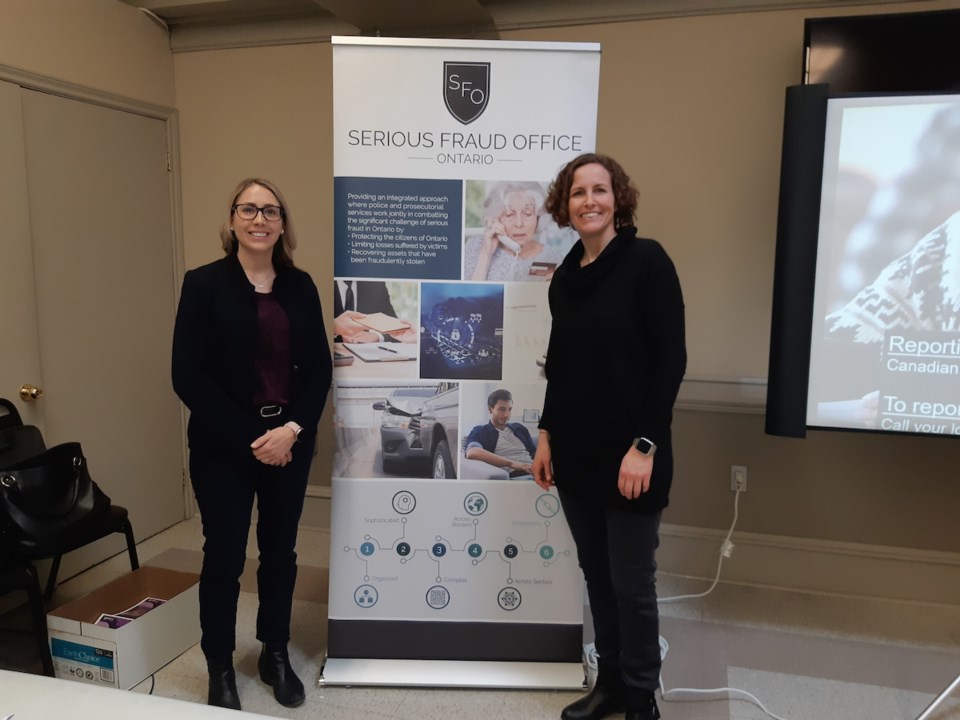"Scammers are sneaky and sly. They can target anyone, from youngsters to retirees." Those words are taken from the preface of a booklet titled, The Little Black Book of Scams published by the Competition Bureau of Canada.
Two police experts taught the pitfalls of electronic fraud to a group of seniors as the OPP came to Elliot Lake's Renaissance Active Living Centre Tuesday afternoon. They also passed out copies of the Little Black Book of Scams to those who attended.
The booklet warns, "The best thing you can do is to report the fraud, whatever the amount, to the appropriate authorities. Don't be embarrassed as it will help others from falling for it."
OPP Constables Lisa Cruz and Erin Fraser of the Serious Fraud Office in Toronto, which became active in 2018, put on a joint presentation for Elliot Lake seniors, describing the many different varieties of fraud police are working to control.
They include subscription traps, identity theft, CEO scams (where fraudsters impersonate a senior company executive), health and medical scams, romance scams (some dating sites), business scams, phishing and smishing scams (the latter involving text messages), tax scams, door-to-door scams, emergency scams, purchase of merchandise scams and sale of merchandise schemes.
Constable Fraser explained, "The Serious Fraud Office was set up to investigate and protect people from dishonest deprivation of another's property often with financial gains for the offender which has a significant impact on society or financial loss in total, so there are large monetary losses, many victims and where there's a widespread public concern."
The two officers listed 10 guidelines which will help people avoid serious fraud:
1. Never send money to someone you have never met face-to-face
2. Don't click on links or open attachments in unsolicited email
3. Don't believe everything you see
4. Don't buy online unless the transaction is secure
5. Be extremely cautious when dealing with anyone you've met online
6. Never share your personal information over the phone or online
7. Don't be pressured to act immediately
8. Have strong passwords for each account/login and keep.them private
9. Whenever possible, work with local businesses that you know
10. Be cautious about what you share on social media
The police officers are part of the support service of the Serious Fraud Office. Constable Fraser said, "We hope we're making an impact for the citizens of Ontario in the fight against fraud. It's a unique office in that it has three pillars, investigation, prosecution and support services."
Some of those in the audience had lost money to electronic fraudsters. One man said he lost $8,000 last year. Another man was bilked out of $3,000 after he was approached by someone purporting to be his daughter. The Serious Fraud Office also has a victim liaison component.
Fraser explained, "Fraud is a stressful thing."
"If you've been a victim and it's not just financial losses. It's really tough to do battle and when cases are seen with us, the victim liaison is also with you from the start of the case to the end," she went on.
The officers played a video portraying actual victims of fraud based on online dating, an investment scheme which destroyed one man's savings and parent's retirement income, sales fraud, and a number of other schemes.
It demonstrated that victims come from all walks of life, including a retired school teacher, a librarian, a healthcare administrator, a retail manager, a freelance photographer and an architect.
"We just hope you guys can share a little bit of this with family and friends,” Constable Cruz told the audience.
"I know I have about 10 warrants out for my arrest right now,” she added. “I have so many voicemails from these scammers. Has anybody received that robocall voicemail saying you're going to be arrested if you don't pay your taxes?"
"Any emails or text messages, delete them. Do not follow any links that are attached to it. Do not give any of your personal information. And with the phone calls, if you get the robocall where they want you to press '1' to continue, that's going to send you to a scammer," she went on.
Under the topic of recognizing the signs that something is amiss, red flags to watch for include wire transfer, overpayment, spelling mistakes, personal information request, unsolicited calls, unsolicited friend requests on social media, astounding mail offers and everything that seems too good to be true.
Their advice is to contact local police if you've been defrauded or think you might have been.
Other reporting stops, or places to get more information about fraud, include the Canadian Anti-Fraud Centre at 1-888-495-8501 and the Competition Bureau at 1-800-348-5358.
